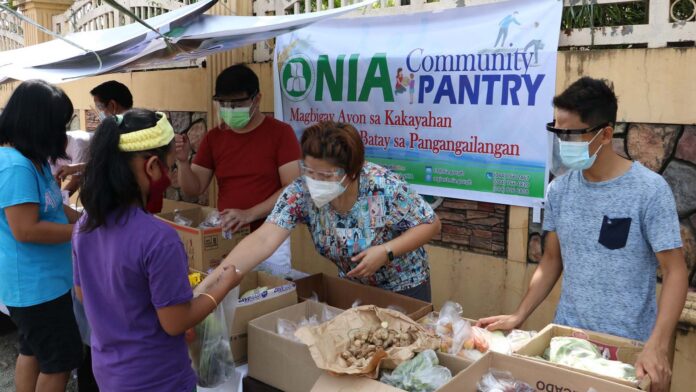“Ang mga Pilipino ay Makabayan.” We have seen this statement all over social media due to several community pantries being launched in service for people who are facing a hunger crisis. While this grass-roots action does give us hope and warmth to see several Filipinos, regardless of economic status, help their fellow countrymen, this should alert us to the reality we are facing now. To romanticize the heroic efforts to initiate these community pantries is to turn a blind eye towards systemic problems that need sustainable solutions that can be provided by the government.
Community pantries started when 26 years old Ana Patricia Non set up a shared pantry in Maginhawa, Quezon City which contained food and other essential goods. There was nothing else except a gentle reminder to “give what you can and take what you need.”
Non started the makeshift pantry as she was tired of complaining and waiting for resolutions to remedy the problems Filipinos are struggling with today. Within days more people have been replicating the cause to their local barangays. The community pantry not only offered food security but nutrition security as well since most of the products offered are fresh vegetables and meat which are healthier options than instant noodles found in ayuda packs.
However as everyone was stepping up to help in their own communities, the power of volunteerism became a threat to the administration that has been criticized for its actions (or lack thereof) against the plight of the community.
On April 19, the National Task Force to End Local Communist Armed Conflict (NTF-ELCAC) shared several posts on their Facebook pages claiming that community pantries are used as propaganda to recruit citizens to the communist movement. Moreover, the Quezon City Police District started to walk around in the vicinity and asking volunteers personal information all while being armed.
Fearing for the safety of the pantry’s volunteers amid red-tagging, the Maginhawa Community Pantry had to temporarily close its operations to protect those involve in the initiative. Despite Quezon City Mayor Joy Belmonte denying that the police were profiling the organizers of the community pantries, there is still that concern in the minds of everyone genuinely wanting to help the Filipino people.
Yet even with the fear, community pantries thrived because if they do not, then they are letting those in power win over their desire to improve the life of those around them.
The community pantry was never meant to defy or outdo the government’s efforts. It was made from the desperate need to see change immediately. Death by hunger does not wait for the passage of laws such as Bayanihan 3 and other proposed aid and stimulus bills to be in effect. Over 7.6 million families and counting are experiencing involuntary hunger due to lack of food to eat and lack of resources to obtain food. In an interview with Ana Patricia Non, she explained that community pantries should not threaten the government, instead it is a call to let them see that Filipino people are willing to work together towards concrete solutions and policies that can reach thousands more.
“We find the government response lacking. People wouldn’t line up like this if they were getting enough. We’re not asking the government or people to understand or have the same political beliefs — I’m only asking for unity, and not to kill this effort to help each other out.” Non stated in a press conference last April 20.
The simple bamboo cart then turned into a statement to the administration to step up and effectively lead the people. However, the community pantry should not be the main contributor to alleviate the hunger many Filipinos experience today. It was never meant to be something sustainable as it only answers to the immediate need of the people. Red-tagging and threatening the safety of those who initiate social change is revealing the insecurities of the administration that has not been providing enough for the communities. The community pantry is a political statement against the insufficiency we are seeing but that does not mean that it right to falsely tag them as recruitment hubs for rebellion.
In the end, the community pantry should serve as a wake up call that the aid given by the government is not enough to support millions of Filipinos who are struggling due to the effects of the pandemic. Change can happen only if everyone, from the government to those lining up to get food, will work together towards effective solutions amid the growing struggles caused by the pandemic.
Disclaimer: The views and opinions expressed by the author of this story do not reflect those of the PAGEONE Group or any of its components, including Politico.ph. Any content provided by our contributors are of their opinion, and are not intended to malign any religion, ethnic group, club, organization, company, individual, anyone, or anything. (Photo Source: Facebook/National Irrigation Administration Region III)


